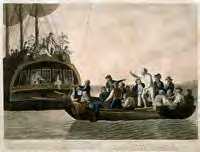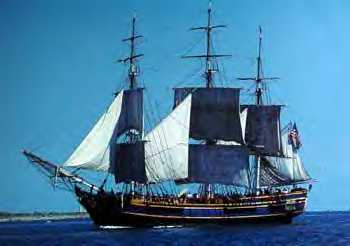Sailmaker on board the Bounty.
A loyalist.
Lebogue was aged 40 when mustering on the Bounty, one of the oldest men in the remarkably young crew.
There is little mention of Lebogue in the literature on the mutiny. He seems to have been highly competent in his craft and a man who went about his work quietly.
On the open-boat voyage from Tofua to Timor, Lebogue and Ledward, the surgeon, came close to dying. On June 10, 1789, Bligh writes:
"Lawrence Lebogue and the surgeon cannot live a week longer if I do not get relief . . . the surgeon and Lawrence Lebogue are indeed miserable objects – I issue them a few teaspoonfull of wine out of the little I have remaining, which may secure their existence as long as it lasts."
If the word "indomitable" has any real meaning, it would certainly be in reference to Lebogue, because he volunteered to sail with Bligh again, this time in the Providence on the second breadfruit expedition. Again, he is hardly mentioned in the accounts of the voyage, but Bligh, in a letter to Banks, writes that Lebogue had encountered Christian's consort on this voyage and adds: "We were with Christian always until his last Departure, which was sudden and unknown."
If this is true, it virtually proves that Christian did not have a permanent attachment among the women in Tahiti at the time of the mutiny. If the woman Lebogue met was Christian's consort, why had she not gone with Christian to Tubuai and later to Pitcairn?
The likelihood is that Christian knew both her and Mauatua during his first stay in Tahiti, but that no permanent attachment was formed.
Sailmaker on board the Bounty.
A loyalist.
Lebogue was aged 40 when mustering on the Bounty, one of the oldest men in the remarkably young crew.
There is little mention of Lebogue in the literature on the mutiny. He seems to have been highly competent in his craft and a man who went about his work quietly.
On the open-boat voyage from Tofua to Timor, Lebogue and Ledward, the surgeon, came close to dying. On June 10, 1789, Bligh writes:
"Lawrence Lebogue and the surgeon cannot live a week longer if I do not get relief . . . the surgeon and Lawrence Lebogue are indeed miserable objects – I issue them a few teaspoonfull of wine out of the little I have remaining, which may secure their existence as long as it lasts."
If the word "indomitable" has any real meaning, it would certainly be in reference to Lebogue, because he volunteered to sail with Bligh again, this time in the Providence on the second breadfruit expedition. Again, he is hardly mentioned in the accounts of the voyage, but Bligh, in a letter to Banks, writes that Lebogue had encountered Christian's consort on this voyage and adds: "We were with Christian always until his last Departure, which was sudden and unknown."
If this is true, it virtually proves that Christian did not have a permanent attachment among the women in Tahiti at the time of the mutiny. If the woman Lebogue met was Christian's consort, why had she not gone with Christian to Tubuai and later to Pitcairn?
The likelihood is that Christian knew both her and Mauatua during his first stay in Tahiti, but that no permanent attachment was formed.
Advertisement
Advertisement




